“You can’t fight a man for the throne without cutting a path to it first.”
The following review will discuss ‘some’ late-game Archetypes and some topics that could be considered spoilers. I do not go into details and keep most conversations about such things rather vague or not at all. As the game has been out for some time, I opted to review it as such.
When talk of Metaphor: ReFantazio began and it was discussed as being something akin to “Fantasy Persona” I have to admit, I was skeptical if that was even the case given this was meant to be a whole new IP. I was further intrigued; however, if that prospect would even work and how the systems across the Persona series would be implemented into a fantasy setting. Now that I’ve wrapped credits after some 95 hours, layered deep with political machinations and themes built around social inequality, classism, and racism across a wealth of different tribes, I can confidently state that Metaphor: ReFantazio is a superb and often incredible experience with only a few blemishes that prevent it from being a true masterpiece.
Metaphor: ReFantazio has the benefit of some big ATLUS names attached to it, despite being the first game from the newly founded Studio Zero. This team was formed by Persona 5 Royal Director Katsura Hashino, P5R character designer Shigenori Soejima, and Persona composer Shoji Meguro. After the release of Persona 5 Royal, they founded the studio to work on a brand new IP for ATLUS, an adventure that would take some of the best elements of the Persona series and place them in a stylized fantasy world. While I have some minor nitpicks with the calendar system which it more or less borrowed wholesale from the Persona series, all the mechanics and systems lifted from their previous work are nonetheless well implemented here making for a fresh and albeit familiar experience.
Metaphor: ReFantazio is set in the United Kingdom of Euchronia, a world that has recently lost its King. He is assassinated in the game’s opening moments, and it’s not too much later that we discover that his son had previously suffered the same fate some time ago. This assassin is the game’s central antagonist; Louis Guiabern, a man who is convinced that his power and vision alone is what the Kingdom and its people need to thrive, that his ideals are above the common man. With his eyes set on the throne, Louis sets in motion his plan to conquer the country and seize this power away from the Church and for himself by any means necessary.
To combat such a vile villain, the story will need a capable and honest hero, and while you can certainly name him anything you like, the canonical name for this hero is Will, a young Elda boy who is tasked with tracking down the individual responsible for cursing the prince and leaving him on death’s door. To protect the ailing royal son, the Prince was placed into hiding to avoid the assassin returning to finish the job. To all but a few, the current story is that the Prince was attacked and mysterious vanishing, presumed dead. Joining Will is Gallica, a fairy who travels with Will as they both make their way to the Capital, seeking a contact who has information regarding the Prince’s curse, a man who failed to protect him during the attack and is eager to set things right.
While many races occupy the Kingdom and its neighboring towns, cities, and settlements, there is a large degree of racism and classism felt throughout the land. The capital is also the home to Sanctism, a religion that is the lifeblood of the Kingdom and has flourished for years. As you walk about, conversations are everywhere, allowing you access to a wealth of world-building as you begin to see the divide in its people, their beliefs on religion, and even the social and financial condition of the various areas of the city. As an Elda, who is a race not looked at too fondly, you’ll take the brunt of this verbal abuse and witness much of it up close. As you too are a newcomer to this land, Will is an outsider who will need to earn their place amongst its people. Initially, many are set to refuse you even the act of commerce, and while they will eventually open up to you through your actions and deeds, you’ll begin to show your worth to them and they'll start to think that maybe their initial prejudices were wrong all along.
You’ll also slowly build up your team of companions with one member of each tribe present across Euchronia, showing that if you have a common goal and put aside your differences, much can be made out of such teamwork. This also allows you to dive deeper into the political landscape across the country and learn more about how the Church and the people see those races. The game dives deep into the themes of racism, classism, and to a large degree, a look at mental health. Anxiety is a huge factor within the game and how it relates to its world. While some titles can often invoke these themes as a way to approach their story and shape their characters, they often keep these ideals at arm’s length, teasing such matters but never fully committing to them. Metaphor: ReFantazio; however, doesn’t shy away from how they not only affect the world created here, but the parallels that are present in our own world, especially when it connects to a great deal of the social unrest and political climate present across the United States.
The game’s prologue, which is featured entirely in the game’s offered demo, sets a lot of the game’s core moments into action. We are introduced to the game’s initial key players; Will, Strohl, Grius, and Hulkenberg. Each will join at different parts in this opening chapter as you attempt to track down your contact and then put a task in motion to kill Louis during the King’s funeral service. Strohl, a once proud noble, will join you as you infiltrate the guard, using this diversion as a means to find your contact, Grius. And, as you attempt to put the plan in motion to kill Louis, Hulkenberg, a former guard and ally to Grius, will join you in an effort to honor the Prince, who she feels responsible for their apparent death.
Where this comes to a head and starts off the intent of the narrative is that the King's Royal Magic makes its presence known as the former King sets in motion a tournament to determine his successor. As he wants the next King to be chosen by the people, and only the people, and without bloodshed, he enacts a powerful spell that prevents the lead candidates from being killed, an event we see firsthand during an attack made on Louis. This sudden revelation then changes the group’s mission as to get close to Louis and even attempt to succeed at this task, Will enters the tournament to become King.
To sway the people and become a legitimate contender for the throne, Will and company then look to convince the minds of the public, especially given the fact you are an Elda. At first, Will’s inclusion is a wild card, but slowly and surely, you'll start to make a name for yourself. You'll do this by tackling side quests, improving your Royal Virtues, and interacting with your followers. Side quests are fairly simple and generally focus on tracking down items or making good on a bounty for a particular beast. That said, I was surprised at the few bounties there actually were.
Royal Virtues are similar to Persona 5’s stats where you would perform different tasks to increase your efficiency in Knowledge, Guts, Proficiency, Kindness, and Charm. Here, your Royal Virtues are Courage, Wisdom, Tolerance, Eloquence, and Imagination. These traits are leveled up by interacting with your followers, completing side quests that offer them as a reward, or reading books and other activities. Frankly, as long as you are engaged with doing one of these per day, you'll easily hit max rank, especially if you take on tasks that assist with leveling up your party members that reward traits like Courage for tackling a bounty. Getting the most out of your days is crucial to how the game balances its systems.
While there are several others that join you in your quest to become king, not all of those who follow you will be part of your team. Followers consist of both the former and latter, and each have stories to tell. Each of these characters, regardless of whether they are simply there to convince the people of your ideals or to those that are part of your combat team, are nonetheless part of the game's social link system, however here is it referred to as Follower Bonds. As they request aid from you, which you'll be made aware of as you start your day or transition into night, a simple visit to them allows you to rank them up and earn rewards while also furthering their arc. And thankfully, those visits actually do bear fruit as each interaction does rank them up instead of contributing to some invisible milestone.
Each of your followers' missions are extremely well written and brilliantly performed and are certainly worth doing, especially if you want to get the most out of the game's epilogue. While I adore the cast of Persona 5, and the interactions you have with the roster, Metaphor: ReFantazio goes the extra mile by making you really care about every single follower. Even with Persona 5 Royal, there were the odd characters I simply didn't care for. Here, I initially wasn't taken with Alonzo or Bardon, but deeper into their arcs, I really started to feel for them. Some of my personal favorites were Brigita and Catherina. Brigita’s arc certainly goes places with her eventually warming up to you to be vulnerable enough to confide in you. Catherina; however, has a more confrontational narrative as she attempts to show her strength, before you eventually discover why she aims to wield such power. Maria is another arc that I wasn't sure I was going to really invest my time with, but sure enough, the hooks got me and I was pleasantly surprised by where it went.
Your party members each have their own arcs as well, stories that allow you to understand their past and where that road well-travelled will pave their future. Heismay, a bat-like creature called a Eugief, was a disgraced knight who left his order. However, once you discover the reason, it becomes a touching story about honoring family and what could have been. While many put on a front of confidence and a rock solid foundation, each member of your party has their own issues they are dealing with, emotional stories that allow you to fully understand them and why they are how they are. Junah, is a famous singer known all around the kingdom, but even she has her own personal struggles and insecurities. One character I really enjoyed getting to know was Eupha, a girl whose only purpose was to be a sacrifice for her people. However, when you discover the root of what her role was truly meant to be, her ability to leave her lands in favor of wanting to understand the world around her is incredibly touching. While it could have led to a series of cheesy fish-out-of-water moments, the game rarely paints with that brush and genuinely allows her to relish in learning about the world around her in more realistic ways.
Louis himself is a remarkably well crafted villain. While he can fall into the trope of being the villain who believes him the world's savior, his plan, and the means he has to achieve it, allows him to be threatening in some truly standout ways. From willingly offering up information about the positives of genocide, especially in front of one whose people is the very topic, Louis is a confident force who isn't afraid to speak his mind and be dangerously honest. Some of my favorite moments with him are the few and rare instances where a plan hasn't gone his way or that something has surprised him, thus allowing us to see him experience these moments firsthand. He does have his own entourage, but the bulk of the more sinister ones fall victim to be fairly one-note. However, his two followers; Basilo and Fidelio, are standouts, and are placed into the story to great effect.
What then unites your team, and allows you to become a serious threat to Louis is through a mysterious and ancient magic that allows you to wield beings called Archetypes. Similar to Persona’s from the Persona series is that you use these forms to perform lethal attacks, passive and defensive buffs, or lower the defenses and attack power of your foe, among a ton of other abilities. Each of your followers will unlock an Archetype that is based on their role in the story. Furthering the relationship you have with as you rank them up will further unlock more of their lineage. With over 40 to unlock, it is worth putting in the time to rank up your followers and unlock them all.
Your main team consists of seven members including Will. Each companion will have a moment, much like in Persona, where they will unlock their Archetype, in a typical violent manner. Here, they rip a heart from their chest and unleash the power within. While they will start in that form, you are free to swap any member of your team to any Archetype. In fact, it is encouraged as those further unlocked will require you to level up or max out certain Archetypes in order to even use them. Each Archetype has a max of four slots to bring over other skills. So, if you already maxed out the Healing classes and want to lean into something that does a bit more damage, you can bring those healing skills over to any Archetype you want.
To benefit from these powerful forms, you'll need to unlock and level them up. While access to the forms are within each of your followers, you'll earn MAG which is used to unlock the forms for use across your entire party as well as unlocking borrowed skills from other Archetypes. MAG is earned constantly, and there are plenty of ways to farm that and Reeve, which is the currency you'll use for money in the various shops. You'll also find consumables that level up your Archetypes constantly as you'll want to ensure that certain companions have access to the Archetypes you unlock near the end of the game. Each character will have their own level within each Archetype, so it pays to use the consumables on the forms that are a prerequisite to what you actually want. Otherwise dungeons will serve as a good way to grind away and levels to make you a stronger and more capable force.
The Archetypes present across the game consist of a lot of different genre staples. However, while there are over 40, they all have a base across 14 initial forms. This consists of the Berserker, Brawler, Commander, Faker, Gunner, Healer, Knight, Mage, Masked Dancer, Merchant, Seeker, Summoner, Thief, and Warrior. Eventually, you unlock a variety of alternatives such as the Sniper, Death Knight, Warlord, Martial Artist, and tons more, all being similar in some ways but granting more powerful and more potent abilities, such as the more advanced healer classes having better and more efficient healing skills.
Combat plays out similar to that of Persona, with a bigger emphasis on being able to attack in real-time as you navigate dungeons and various locations. Some enemies can be defeated easily this way whereas others will allow you to get the jump on them and lead into the fight with a bonus attack. That said, if you are struck before you can hit them, you’ll start on the back foot with being attacked at the start of the round. While attacking freely is a easy way to clear the map, you cannot access the result screen to level up Will, so you'll want to watch that experience bar and ensure you can level him up or have to wait until you do so again. That said, If I am missing a better way to find this, do let me know in the comments.
Battles allow you to attack, use items, defend, or use your Archetype’s skills. Some attacks, such as Perfect Punch, uses your HP to attack whereas most skills use MP. Unlike other games, MP is not gained back on attack but only through consumables, resting back at an Inn, or through particular skills accessed by a specific Archetype. Combat is about breaking down your foe, either through sheer physical means, the use of skills to attack their weakness and earn an extra turn, or by breaking through their defenses and applying a wealth of de-buffs to them. One battle in an optional tower near the finale of the story, for example, has a boss that was a huge skill check. However, swapping my Archetypes to apply additional attacks and buffing my Sniper then allowed me to blast them to kingdom come.
However, combat does have some issues. Mainly when you miss an attack. This becomes a huge issue during the final encounter. When you miss, you lose a few turns that your teammates would have taken. I've had my first character miss with five turns remaining to be down to one after the miss. And when the boss has 4 to 5 turns in response, to be down to one and then pull off a spell to gain 4 more, it becomes a devastating series of errors when you miss. If you do find the combat too challenging, you can opt in to Story Difficulty, which allows you to have an instant revive If your party wipes. Thankfully, this revive keeps the boss’s health where it was, so it allows you to refill your MP back to full and keep pummeling him.
The locations you'll visit are all around the Kingdom. From massive cities to explore and purchase new equipment, to the ruins and dungeons that are found in the outskirts. Travelling around will consume time. Locations in close proximity will allow you to still return at night whereas those that require that you camp will find you to your destination in the morning. Eventually, you'll be able to fast travel to locations you've been before and this speeds up your ability to go grind if you need or tackle side quests that place you back in familiar places.
The calendar system returns from Persona and while it does serve a narrative purpose here, I still have problems with it. If I was to leave the city and head to a nearby dungeon and spend hours there slashing away at enemies, earning a wealth items as I use my Thief Archetype to snag some goodies, then tackle the boss, that apparently takes the same amount of time as having a conversation that can grant you an increase to your Royal Virtues. While I understand that you generally have time to tackle two objectives per day, during the afternoon and at night, I still wish this system allowed a difference between an event and a true objective, that or giving me the morning to handle some minor business. Again, I think the Calendar system is a fine enough mechanic, I just wish there was more flexibility between objectives that should take a while and those that are bite-size in nature.
Persona 5 Royal has one of the best soundtracks of all time and while I was sure that Metaphor wouldn't match it, it has some fantastic highs that still present a solid outing for the title. Some of the moments built around the story are wonderfully done, but the chanting-like score for the game's battle theme was fine but rarely much more than that. Attempting to compete with the masterpiece that is Persona 5 was going to be tough, but the results here are anywhere from great to fantastic, but does fall short in comparison.
Visually, Metaphor: ReFantazio is going to be divisive due to its simple level design, often bland and uninteresting texture work and character models that range from great to extremely weak. Characters that have some significance to the story are fine, often great, but the citizens, whom the story plays a large role towards, are a few notches above what you normally see filling stadiums in Madden. All that said, the art design, animated cutscenes and especially the game's menus, is second to none. Metaphor is often a stylish and superb experience that shines in the variety of its main cities and locales. Sure, the level design isn't tremendous when you are exploring maze-like environments ad naseum, but the designs of the monsters, the main cast, and the flash and substance built around all of this is stunning to no end.
Metaphor: Refantazio expertly nails what it means to do. Its narrative and cast of characters shine in a wondrous fantasy setting that provides a ton of opportunity for a continuing series. While it doesn't stray too far from the Persona foundation, it is unique enough to satisfy both camps of players who may or may not get on with their previous work. While the pacing can drag on in some moments with the calendar system, and a final encounter I found to be exhausting, I am still a huge fan of what Studio Zero has crafted here, and am eager to see what they work on next.
Developer - Studio Zero.
Publisher - ATLUS, SEGA. Released - October 11th, 2024. Available On - Xbox Series X/S, PS4, PS5, PC. Rated - (T) - Blood, Language, Mild Suggestive Themes, Use of Alcohol, Violence. Platform Reviewed - Xbox Series X and S. Review Access - A review code was provided by the publisher for the purpose of this review.





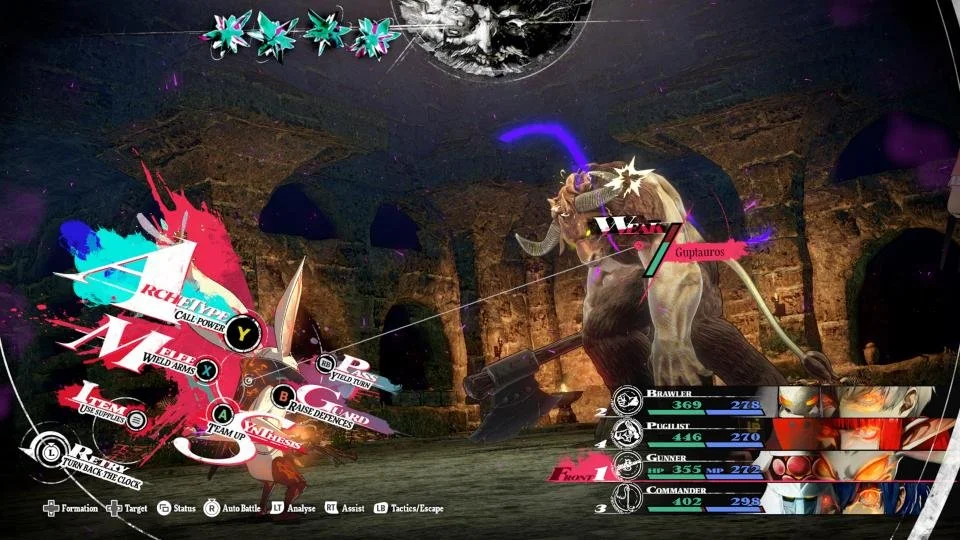

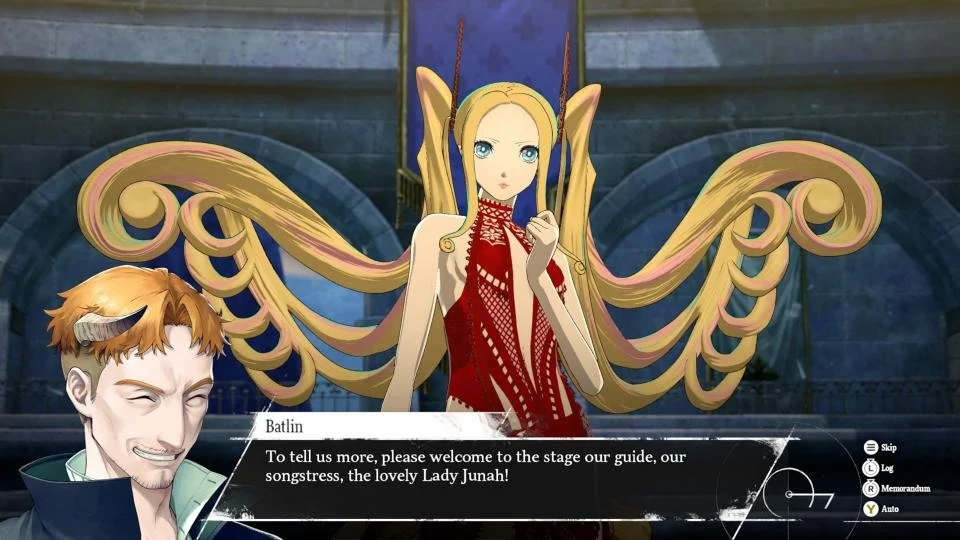
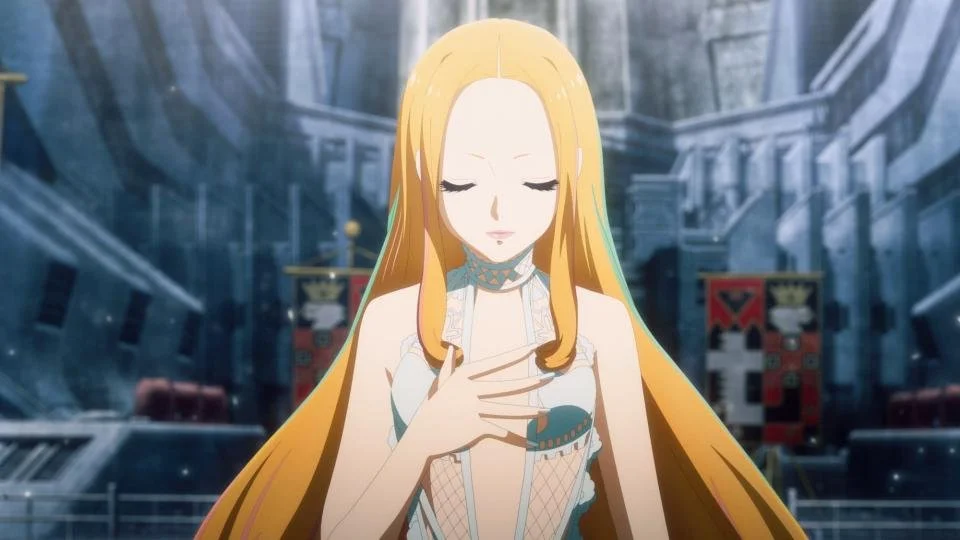
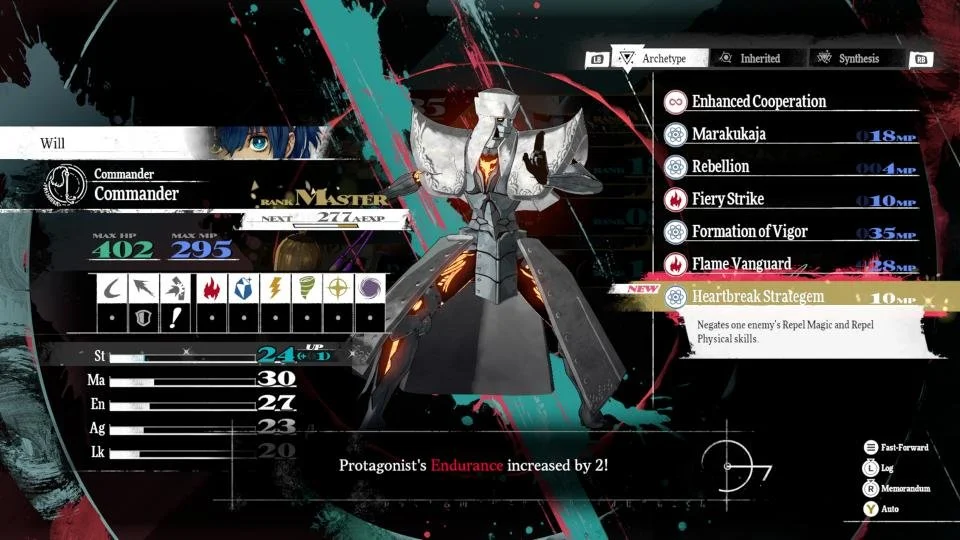
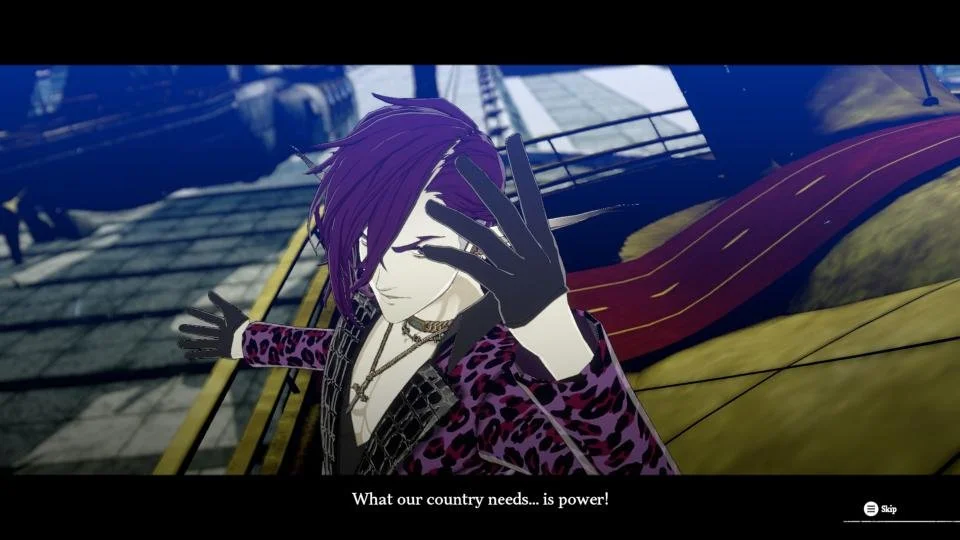

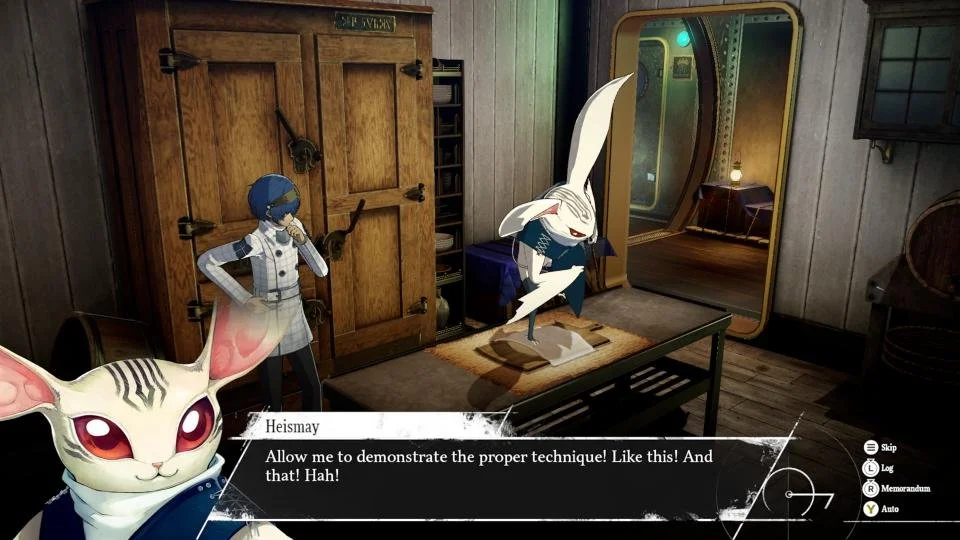









Jeff is the original founder of Analog Stick Gaming. His favorite games include The Witcher III, the Mass Effect Trilogy, Hi-Fi Rush, Stellar Blade, Hellbade: Senua’s Sacrifice, and the Legend of Heroes series, especially Trails of Cold Steel III & IV.